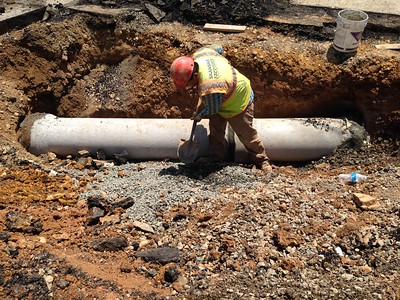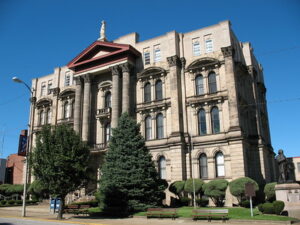If you want to know what happens when a public board doesn’t provide authentic oversight, look no farther than the Prichard Water Works and Sewer System in Prichard, AL. The five-member board oversees the water utility for Prichard and Chickasaw, in Mobile County.
The utility’s infrastructure is more than 80 years old, and is in need of significant repairs. To that end, in 2019, the utility took out a $55M loan from Synovus Bank, backed by the revenue generated by its customers. The utility intended to use the money to upgrade its metering system, dig a new community well to reduce its reliance on the Mobile Area Water and Sewer System (MAWSS), and make repairs to the company’s aging infrastructure.
Last February, the Federal Bureau of Investigation and the Mobile County Sheriff’s Department raided the utility’s offices, as well as the home of at least one Prichard Water Works employee, looking for evidence of theft and public corruption. Just weeks prior to the raid, the utility applied for $333 million in COVID-19 relief funds through the Alabama Department of Environmental Management (ADEM). The ADEM has said that the Prichard utility, which serves about 32,500 customers and has fewer than 30 employees, applied for more federal funding than any other utility in the State of Alabama.
Lack of oversight costs utility millions
In November 2022, the utility partially missed a payment on the Synovus loan. That missed payment coincided with the arrests and indictments of several Prichard employees following a Mobile County grand jury investigation into financial irregularities at the utility. Among the problems the grand jury found were purchases of luxury goods, vacations and other items made by Prichard employees using the company’s credit card. One employee is accused of making purchases that exceeded $200,000. Prosecutors in the case claim the utility’s losses are in “the millions of dollars.” Those arrested include the utility’s former manager, its operations manager, the physical services manager, and the public services supervisor.
But the utility’s problems haven’t stopped there. The Prichard Water Board, which is supposed to provide oversight, is divided. Two board members, John Johnson and Cherry Doyle, who have tried to sound the alarm regarding the pending loan default, say the other three board members, who serve as the Board officers, refuse to meet to address the utility’s issues. Johnson and Doyle have gone so far as to hire an attorney at their own expense. Without the cooperation of at least one of the officers, the Prichard Water Board cannot hold a public meeting or conduct official business.
Last month, Johnson and Doyle attempted to call a special meeting. With a house full of angry utility customers, they could do nothing because the board officers refused to attend. A second attempt at a special meeting produced the same result. Johnson and Doyle claim that the Board Chair, Russell J. Heidelburg and other officers, deliberately withheld bank correspondence regarding the utility’s partial loan payment in November and missed payment in December. The utility made a full payment in January.
Town may lose utility to the bank
Johnson and Doyle want to know how the utility, which has collected about $4M in revenues since November, is spending its money. But they claim their requests for information have gone unanswered by the Board Chair and utility employees.
At this point, Johnson believes that a bank takeover of the utility is inevitable and that the other members of the Prichard Water Board are attempting to dissolve the utility and walk away. The Prichard Water Works and Sewer System was scheduled to make another payment on March 2. The bank has given the utility until April 1 to bring its past due payments current or face legal action.
A Board that doesn’t provide oversight isn’t doing its job
This is a good example of what happens when a board does not provide actual oversight of a public entity. In this case, you have a public utility that provides a must-have service to its customers. There is no room for compromise in the service, yet the management of the utility spends literally millions of dollars of the utility’s money on personal purchases. The lack of authentic oversight allows this diversion of funds to continue for so long that the utility allows its infrastructure to crumble – which can cause life and safety issues – and literally defaults on a bank loan.
The Board takes no notice of the failing infrastructure – or if it does, it does nothing about it. Maintaining infrastructure is expensive. (Damned expensive.) Public infrastructure requires continuous maintenance and upkeep, especially when it involves critical services like water and sanitary sewage connections. At a public entity, failing infrastructure is a symptom of a larger problem. It should never, ever be ignored by the Board of Trustees.
The Board’s job is to ask questions, so if the Board isn’t asking basic questions, like “Where did the money for infrastructure maintenance go?” there’s a problem with the Board.
Photo Credit: Urban Shocker, via Flickr















